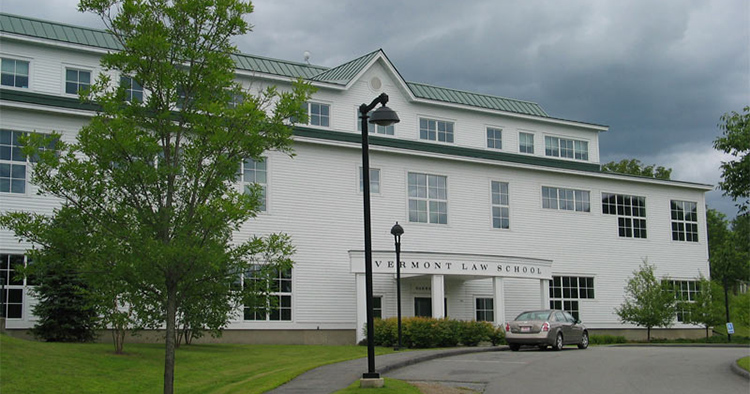Vermont Law faculty had little say when tenure was removed, says new report

Vermont Law School's Oakes Hall. Photo by Jared C. Benedict, via Wikimedia Commons.
When Vermont Law School, facing significant financial pressures, stripped 14 professors of tenure in 2018, it did not adequately involve faculty in the decision-making process, according to a report from the American Association of University Professors.
The finding could lead to AAUP members voting to sanction the law school, Inside Higher Ed reported Wednesday. If Vermont Law is placed on the sanctioned school list, that could harm future faculty recruiting efforts, according to VTDigger.
The report states that many law schools, including Vermont Law, face financial hurdles. Enrollment dropped after the 2008 financial crisis, and as class sizes got smaller, the amount of scholarships increased. Vermont Law is a private, stand-alone school with a small endowment, according to the report, and in the fall of 2017, enrollment and discount rates did not meet projections, while strategic initiatives failed to generate anticipated revenue.
“Despite significant success in increasing enrollment, starting new programs, including nationally recognized online courses, and renegotiating debt service, the school’s reserves were significantly depleted and another year of deficit spending at that level could have forced the school’s closure,” the report states.
Vermont Law faculty reached out to the AAUP in June 2018 following the tenure eliminations. Under AAUP guidelines, schools facing “financial exigencies” can terminate faculty appointments for reasons other than cause, but faculty must play a significant role in the decision-making process. That didn’t happen at Vermont Law, according to the May 2019 AAUP report.
AAUP’s recommended regulations are similar to the American Bar Association’s Model Rules of Professional Conduct, in that schools can choose if they want to adopt them, Gregory Scholtz, who directs the AAUP’s department of academic freedom, tenure and governance, told the ABA Journal in 2018. According to a 2018 VTDigger article, Vermont Law School has adopted AAUP recommendations in its faculty handbook.
Thomas McHenry, Vermont Law’s dean, told the ABA Journal in an email that the AAUP did not make all the factual corrections to the report that the law school requested. It did print the school’s response to the report, in a footnote.
McHenry wrote that the law school is “deeply committed” to the principles of shared faculty governance, and academic freedom. Also, he claims that the ABA’s Section of Legal Education and Admissions to the Bar, which is responsible for law school accreditation, has been kept informed of Vermont Law’s actions. Standard 201 addresses shared governance, and Standard 405 deals with academic freedom.
“The restructuring steps were taken, in part, to assure our accreditors that the school is financially viable and sustainable,” he says, adding that he thinks the law school is in compliance with all of the accreditation standards. It’s next ABA site visit is scheduled for 2020.
The faculty suggested salary cuts, rather than layoffs, according to the AAUP report. It also alleges that the tenure and review committee and the curriculum committee were not consulted about faculty restructuring, nor was the dean’s advisory committee asked to present faculty suggestions for a full review. Faculty members who did submit ideas to the administration claim that their suggestions were dismissed or they received no response, according to the report.
It also asserts that the law school’s board of trustees had no role in events that led to the restructuring, other than passing a resolution that McHenry was tasked with balancing the budget and approving his proposed restructuring plan.
“In talking with some 20 faculty members and administrators, the investigating committee was struck by the marginal role the board appears to have played in stewarding the law school’s financial resources in a time of crisis. In such situations, governing boards at the very least are usually called upon to ensure that the administration provides the faculty with complete data relating to the institution’s financial position,” the report states.
McHenry joined Vermont Law School in 2017 from a partnership with Gibson, Dunn & Crutcher, and the report cited his time in Big Law as a contributing factor to his decision to revoke tenure without the requisite input from faculty.
“These factors, combined with the fact that Dean McHenry came to VLS from a corporate law practice—instead of from an academic institution with a strong culture of shared governance—helped create a perfect storm, precipitated by the financial crisis, that eventually led to the administration’s unilateral action to revoke the tenure of three-quarters of its tenured faculty members through a process that, in the end, bore a striking resemblance to a corporate layoff,” the report states. The investigating committee of the AAUP, which issued the report, is chaired by Emily M.S. Houh, a law professor at the University of Cincinnati.
Including people in the LLM and master’s programs, Vermont Law has a total of 660 students, McHenry told the ABA Journal. The law school has 25 full-time, long-term contract faculty members, five of whom are tenured. More than half of the previously tenured faculty continue to teach at Vermont Law, under arrangements that were individually negotiated, according to McHenry. He wrote that the tenure decisions were “painful” and could not have been carried out to everyone’s satisfaction.
“We were facing tremendous financial and timing pressures. In an ideal world, we would have liked to have had more time to deliberate and provide greater notice. However, given our financial situation, that wasn’t possible. We did the best we could under a demanding set of circumstances,” he says.



